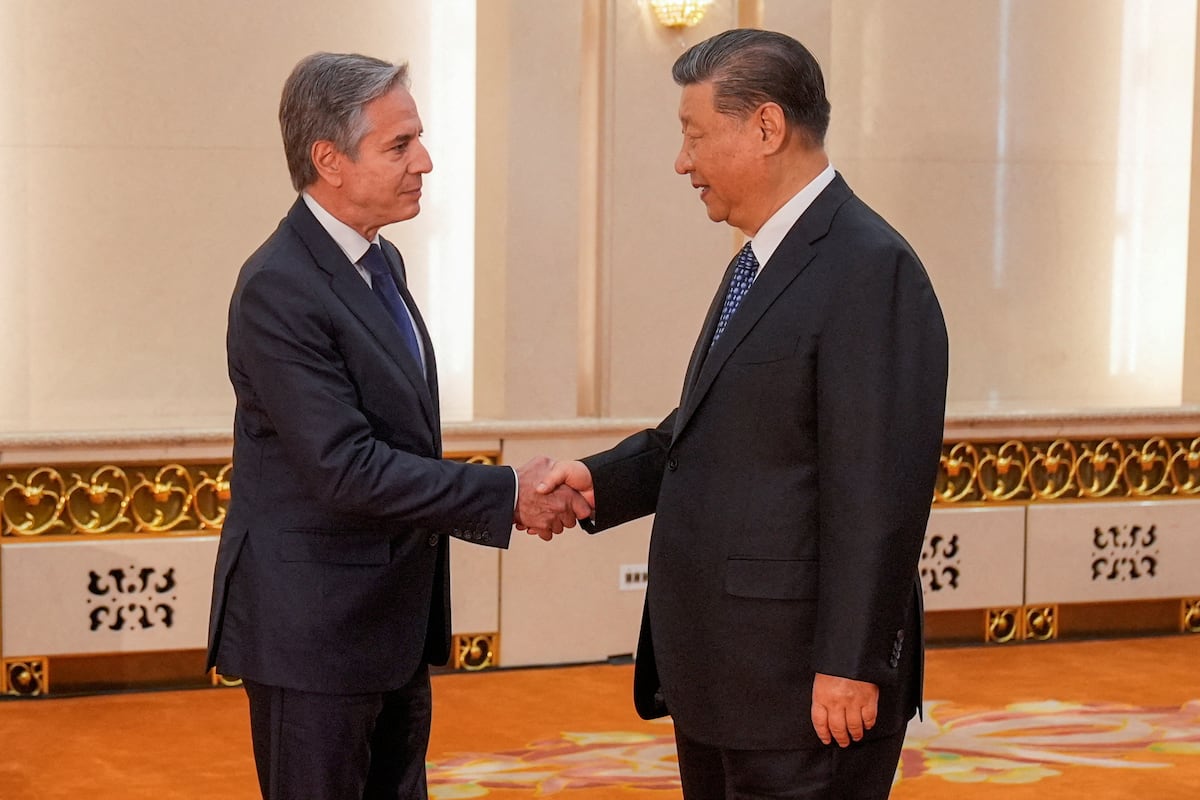China and the United States remain willing to preserve the recent—and fragile—stabilization of bilateral ties, but recognize that “active diplomacy” is necessary to avoid “misunderstandings and miscalculations.” It is the main message after the three-day trip of the US Secretary of State, Antony Blinken, to the Asian country, the second in 10 months. His last stop, which took place this Friday in Beijing, was marked by a meeting of almost six hours with the Chinese Foreign Minister, Wang Yi, and a brief meeting with President Xi Jinping, which, like what happened last June, it was not on the official agenda. The gesture allows us to interpret that things have gone relatively well.
“During these 45 years of bilateral relations, the ties between both countries have experienced ups and downs and have provided us with important lessons: both nations should be partners instead of adversaries; help each other instead of harming each other; seek common ground while respecting differences, and they must be honest in words and firm in actions,” Xi confided to the American, according to the official reading provided by the Chinese authorities.
“The Earth is big enough so that China and the United States can develop together and prosper separately,” Xi highlighted during the meeting in the Great Hall of the People, the headquarters of major political events. “China is willing to see a safe, open and prosperous United States, and hopes that the United States can also look positively on China’s development,” she said.
The division between the two powers was revealed hours before Blinken landed in China, when the US Senate approved a bill that provides some 7.5 billion euros to “counter communist China” in the Indo-Pacific and another that forces ByteDance, the Chinese technology company that owns TikTok, to sell it within nine months; Otherwise, the application of short videos will be prohibited within the country. Blinken has assured the media in Beijing that the issue of TikTok was not mentioned in the meeting.
Reproaches for Ukraine
The extensive and thorny agenda suggested that the meeting points would be limited. The war in Ukraine has occupied much of the conversations. Blinken has raised concerns with Xi that Chinese companies are helping to re-equip and resupply the Russian defense industry with components essential for weapons manufacturing. “Feeding the Russian military industrial base not only threatens the security of Ukraine, but that of all of Europe. We have long communicated to China that guaranteeing transatlantic security is one of the main interests of the United States. And in our conversations today I made it clear that China is not addressing this problem,” Blinken said in a press appearance. However, he has avoided giving details of the response he has received and whether he has communicated the measures that Washington could take against these companies.
Join EL PAÍS to follow all the news and read without limits.
Subscribe
The two parties are aware that the enormous and growing divergences between them can truncate the progress achieved in the last year at the slightest change. 12 months ago, ties were at their lowest point in decades after Washington shot down an alleged Chinese spy hot air balloon that was crossing US territory without permission. But they were already very resentful in 2022, after the visit to Taiwan of the then president of the US House of Representatives, Nancy Pelosi, to which Beijing responded with unprecedented military maneuvers around the island. Thanks to the intense diplomatic efforts between officials of the two giants, the talks have become much more routine, which has allowed the two largest economies on the planet and rival geopolitical powers to redirect their tense but interdependent relationship.
Prior to the meeting with Xi, Blinken met at the Diaoyutai guest residence with his Chinese counterpart, who received him with a tougher speech. Wang has conceded that, after the Xi and Biden summit held last November in San Francisco, “relations have stabilized” and “cooperation and positive interactions in various fields” have increased. However, “negative factors continue to appear and accumulate, causing damage and interference to China’s legitimate right to develop, and posing a constant challenge to China’s interests,” said the head of diplomacy of the Asian giant.
Even with the cameras in front, Wang emphasized that it is essential that China and the United States adhere “to the correct path of stability” or, otherwise, they could “fall back into a vicious circle.” He also stressed that Washington “must refrain from interfering in China’s internal affairs and from crossing its red lines regarding its sovereignty, security and development,” a clear reference to Taiwan, the democratically self-governed island that China considers an inalienable part. of its territory.
Russian President Vladimir Putin confirmed on Thursday that he will travel to the Asian giant in May, although without providing further details. The head of the Kremlin last visited China last October. Reuters also reported on Thursday that a US-sanctioned Russian cargo ship has been docked at a shipyard in eastern China’s Zhejiang province since February. This is the Russian ship Angarawhich since August 2023 has transferred thousands of containers that allegedly contain North Korean ammunition to Russian ports.
Among the entourage accompanying Blinken are Todd Robinson, deputy assistant secretary for International Narcotics and Law Enforcement Affairs, and Nathaniel Fick, ambassador-at-large for Cyberspace and Digital Policy. US authorities hope that China will make progress in containing the flow of chemicals used to manufacture fentanyl to the US.
Blinken arrived in Beijing on Thursday from Shanghai, where he urged authorities to offer a level playing field to American companies. His trip comes two weeks after that of the US Treasury Secretary, Janet Yellen, who made it clear that her country maintains its misgivings about Chinese economic practices and warned of the “risk” and “negative effects” of Chinese productive overcapacity.
